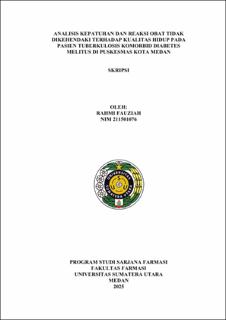| dc.description.abstract | Background: Tuberculosis (TB) and diabetes mellitus (DM) worsen the patient's condition, with DM increasing the risk of TB infection.
Objective: To determine the differences in characteristics, adherence, and adverse drug reactions (ADR) with quality of life.
Method: A cross-sectional quantitative descriptive study at the Medan City Health Center from November–December 2024. Data were collected through questionnaires and interviews related to adherence (MARS-5), quality of life (EQ-5D-5L), ADR, and patient medical records. Univariate and bivariate test data analysis.
Results: Total 68 patients, with the majority male (63.2%), aged 46–73 years (80.9%), high school education (42.6%), self-employed (44.1%), suffering TB <6 months (63.2%), in the continuation treatment phase (69.1%), and suffering DM <5 years (79.4%). The majority of patients adhered to treatment (88.2%), experienced ADR (80.9%), and had very good quality of life (77.9%). There are significant differences between age, education level, TB treatment phase, and duration of DM (p < 0.05), while there are no significant differences between gender, occupation, and duration of TB with quality of life (p > 0.05). There is no significant difference between adherence and quality of life (p = 0.264). There is a significant difference between ADR and quality of life (p = 0.038).
Conclusion: There are significant differences between age, education level, TB treatment phase, duration of DM, and ADR with quality of life (p < 0.05), while there are no significant differences between gender, occupation, duration of TB, and medication adherence with quality of life (p > 0.05). | en_US |


